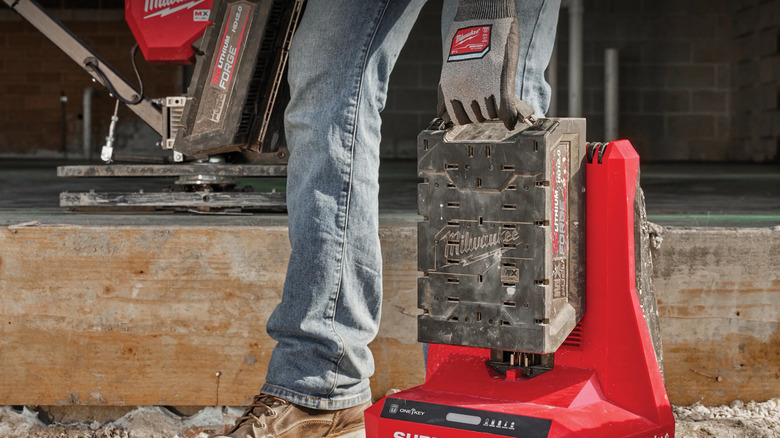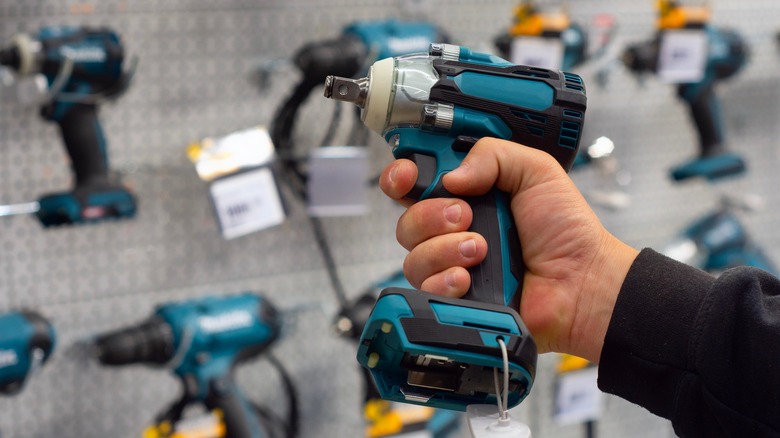DeWalt Or Milwaukee Batteries: Which Brand Has The Right One For You?
DeWalt and Milwaukee are two of the giants among power tool manufacturers. While DeWalt is often rated the most popular power tool brand in the US, Milwaukee is arguably its greatest rival. Time and again, the two face each other in direct comparisons: reviews of DeWalt vs. Milwaukee circular saws or which brand has the superior cordless drill, for example.
Key to the performance of any power tool is its battery, and both DeWalt and Milwaukee offer several options. In order to decide which is the right one for you, we need to look at the performance, compatibility, and price. Both brands produce 12V tools, but with limited battery options. If you're buying those tools, the focus should be on device specification. It's when we look at full-size tools that the batteries get more interesting.
The first thing many people will note is that Milwaukee's main battery range is 18V, whereas DeWalt's is 20V. So you would think the latter delivers more power. Actually, that's not the case. DeWalt quotes initial voltage, whereas Milwaukee quotes nominal voltage (when the tool is running normally). In practical terms, they both deliver the same output. We need to look elsewhere to decide which brand's batteries are better.
DeWalt and Milwaukee tool batteries offer similar power levels
DeWalt has two types of 20V batteries, Max and Max XR (eXtreme Runtime). Both work with any current 20V DeWalt tool. They also have FlexVolt 20/60V batteries that can sense the power needs of the tool they are attached to and automatically switch to the required voltage. Again, they fit any tool in the current DeWalt range (except 12V).
Milwaukee offers M18 batteries at 18V and MX Fuel batteries at 72V. A recent addition to the MX Fuel range is Forge batteries that offer longer run times. M18 batteries fit all current 18V tools, and MX Fuel batteries fit all 72V Milwaukee tools, but you cannot put an MX Fuel battery on an M18 tool.
So in effect, if you bought a 20V and a 60V tool from DeWalt, you could use the same FlexVolt battery and charger for both. If you bought M18 and MX Fuel tools from Milwaukee, you would need two batteries and two chargers. Note that if you're considering what tool batteries are compatible with each other, you cannot directly fit any DeWalt batteries to Milwaukee tools, or vice versa.
Consider price and longevity when choosing between DeWalt or Milwaukee batteries
At first glance, it appears Milwaukee's 72-volt batteries have the edge on power, but there are DeWalt models that can combine two FlexVolt batteries for 120V performance. Battery technology tends to change rapidly, so Milwaukee might also develop tools running theirs in tandem, but they haven't done so yet.
When it comes to price, it's important to check the kind of deal you can get because you can often make savings by buying batteries and tools together in a kit. However, in general, DeWalt batteries are usually a little cheaper. Milwaukee batteries probably have the edge on durability, lasting up to five years or 1,000 charging cycles. By contrast, DeWalt's life expectancy is around three years and up to 500 charging cycles. In either case, it's important to avoid common storage mistakes that could damage them to aid with longevity.
It's tough to choose a 'best' power tool battery, and the market is changing all the time. Much will depend on whose tools you favor. If you buy some from DeWalt and some from Milwaukee, you can't avoid needing a bunch of different batteries and chargers, and that can get frustrating. If you haven't already made the jump to one brand or the other, then thinking about your requirements and which tool range meets those demands will go a long way to deciding which batteries are right for you.


